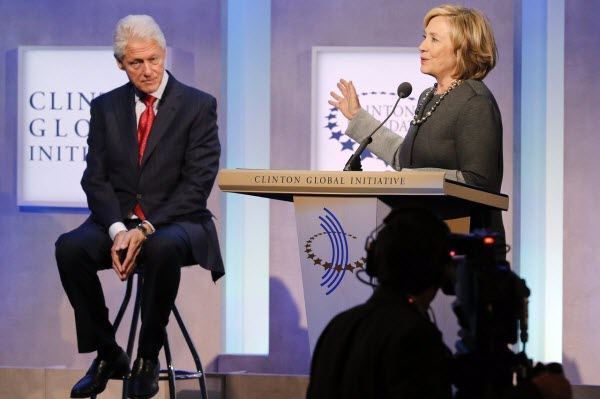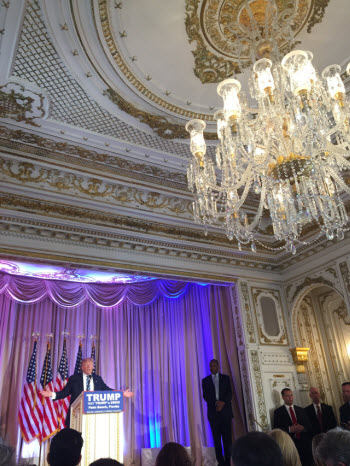E-mail. Benghazi. Why So Little Attention to the Clinton Money Trail?
Hillary Clinton clearly believes that rules do not apply to her, and “this is precisely the kind of governance” we can expect were she to be elected president, warns a Wall Street Journal editorial.
That was deserved, given her use of a private server for e-mail while secretary of state. In the face of a scathing report from the State Department’s inspector general, she would only acknowledge that using a private server was “a mistake”. She had refused to hand in that server, holding back 32,000 e-mails she decided were “personal”. She had said she would cooperate fully with the investigation, but she and several of her top aides refused to be interviewed by the IG. One e-mail in the 30,000 that were turned in to investigators said she rejected an aide’s suggestion to switch to an official e-mail address because, “I don’t want any risk of the personal being accessible”. Exposing government business to cyber hacking was a lesser concern, evidently.
Of a different sort was the relentless crusade by those on the right to make her responsible for the inadequate security that led to the loss of life in the attack in Benghazi in September 2012 and for then, fearing consequences in the presidential election two months away, calling the attack a response to an anti-Islam video rather than admitting it was by a terrorist group. Shock at the culpability and incompetence of Clinton was daily fare — and still is, today as this is written — in Fox News’ propaganda campaign to block Ms Clinton from ever becoming president.
again until we get it right
That yet another House committee was set up in May 2014, after investigations by the State Department itself and by seven congressional committees that had issued nine reports, speaks loudly that is was for the political purpose of keeping those accusations alive. California Republican representative Kevin McCarthy said as much when he let slip, “Everybody thought Hillary Clinton was unbeatable, right? But we put together a Benghazi special committee…”, illustrating Michael Kinsley’s definition of a gaffe as when a politician tells the truth.
The Republican-controlled committee moved at the pace of garden slug and only just now released its report two years and $7 million later. It faults the defense and intelligence arms of the Obama administration for leaving our outpost so exposed, but, other than its tangential discovery that Ms Clinton used a private e-mail server, comes up with nothing that finds her directly culpable of the Benghazi debacle. Committee chairman Trey Gowdy (R-SC) emphasized that the inquiry was not about one person, it was about four people (i.e, the U.S. ambassador to Libya and three others) and was left with the rather pointless criticism that, “Nothing could have reached Benghazi because nothing was ever headed to Benghazi”, long after it had been determined that no military asset was deployed because nothing could have reached Benghazi in time.
looking in the wrong places
Which brings us to the question of how these two investigations have won almost all the attention of the media, displacing what this page contends should have drawn the more intense scrutiny — the record of Bill Clinton gathering up vast sums of money from parties whose business came before Hillary Clinton’s State Department from 2009 to 2013 when she was its secretary and could arise during her possible presidency.
Start with this episode: The United Arab Emirates wanted a facility at their Abu Dhabi airport where their privileged could have their visas pre-cleared before boarding flights to the U.S. so they wouldn’t have to wait in line on arrival in this country. Only five others have been extended this convenience: Canada, Ireland and three Caribbean countries.
American and other airlines were dead against, as it would give the U.A.E. airline, Etihad Airways, an unfair advantage. The U.S. Chamber of Commerce, the AFL-CIO, unions for pilots and flight attendants and 
EUROPEAN PRESSPHOTO AGENCY
more than 150 lawmakers from both parties ultimately opposed it,
reported the The Wall Street Journal. Hillary Clinton’s State Department and Homeland Security nevertheless issued a “letter of intent”, whereupon Bill Clinton was invited to Abu Dhabi, the U.A.E.’s capital city, to give a speech, actually the first of two.
The invitation for the first talk in December 2011 was from an environmental group. He would speak for 20 minutes on climate change, for which he was paid $500,000. Despite the subject, the Etihad airline proved to be one of the sponsors. The second speech a year later was on the value of tourism for another $500,000. A week later, the U.S. and the U.A.E. signed the agreement authorizing the pre-clearance facility.
It was “farcical” to suggest any connection between Bill Clinton’s talks and the approval, said a State Department spokesman. So we are asked to believe that what Bill had to say about climate and tourism were of such high import and edification that Abu Dhabi groups gladly paid $1 million for the privilege of hearing him and for no other consideration.
money for nothing?
By agreement with the Obama administration in 2009, the Clinton Foundation ceased accepting contributions from foreign governments as a condition for her appointment as secretary of state. Once she left that office in 2013, the practice resumed, regardless of her obvious intention of running for president. The Wall Street Journal reported that by 2014 Clinton was getting contributions for his fund at an accelerating rate — more than $1 million from the U.A.E., millions from Saudi Arabia and Oman, hundreds of thousands from Qatar, Germany, Australia and a Canadian agency that was promoting the Keystone XL pipeline. The newspaper tallied that in all Bill and Hillary raised from $2 billion to $3 billion during the last two decades. In the 2001 to 2015 window after his presidency, The Washington Post tallied that Bill and Hillary had collected $158.3 million for speeches alone.
Was this just feel good money? Individuals, corporations and foreign governments contributing to worthy causes? Or did they expect something more? The pair insist there is never any connection between Bill’s foundations and Hillary’s political world.
nary was heard a discouraging word
Wall Street has always been among their largest sources of money from Bill Clinton’s run for the presidency in 1992 to Hillary’s build up to her presidential run, as Bernie Sanders constantly hammered home. In another report, the Journal dug into the pilgrimages to the Street and found that Hillary had been paid $4.1 million for “closed-door talks” between her job at State and her declaring her candidacy. Those attending say the talks were “friendly and light” and avoided anything controversial such as Wall Street’s role in the 2008 crash. To the contrary, she sometimes thanked the bankers for what they had done for the country.
So again we are left to ponder why major Wall Street firms — Goldman Sachs, Deutsche Bank, Morgan Stanley, Bank of America and UBS are listed — paid $225,000 a speech to listen to little more than pleasantries — unless they thought there would be something, someday, to show for it.
sanctions lifted
Peter Schweizer heads the Government Accountability Institute and was formerly with the right-leaning Hoover Institution. We’ve previously reported on his investigative work that revealed members of Congress trading on inside information . He also wrote, “Clinton Cash”, another source for today’s topic. He cites the Swedish telecom company Ericsson, which had in 2011 been called out in a State Department report for selling equipment to oppressive regimes. The Obama administration was working up new sanctions that would enjoin companies from doing business with Iran. A week before the sanctions were announced, Bill Clinton gave a speech at Ericsson. He was paid $750,000. Ericsson mysteriously disappeared from the list. The Clintons would say that there is no connection for that softened stance.
minecraft
Another, with serious ramifications: In 2005, Canadian mining financier Frank Giustra flew to Kazakhstan to meet with its authoritarian leader, Nursultan Nazarbayev. Giustra was a newcomer to uranium mining in Kazakhstan who needed heft, so be brought along Bill Clinton on his private plane. An exhaustively researched New York Times story reported that within days, Giustra had cut a deal that won him stakes in three highly lucrative state-run uranium mines for his company, UrAsia Energy Ltd.
In 2007, UrAsia merged with South Africa’s Uranium One, keeping that company’s name. Straightaway, Uranium One began buying companies in the U.S. that held uranium assets across the western states. The company intended to become “a powerhouse” in uranium “with the potential to become the domestic supplier of choice for U.S. utilities”.
A year later, as Hillary Clinton ran for president against Barack Obama, the Times discovered that Giustra had contributed an undisclosed $31.3 million to Bill Clinton’s charitable foundation. Shortly thereafter, at a gala with Hollywood stars in attendance and performances by stars-for-hire Elton John and Chakira, Giustra would pledge another $100 million, this to the Clinton Giustra Sustainable Growth Initiative, which planned to promote ethical labor and environmental practices in natural resources industries.
A year later in 2009, a subsidiary of Rosatom, the Russian atomic energy agency, looking for uranium sources to bolster its insufficient reserves, stepped in to buy 17% of Uranium One, now based in Vancouver, and within a year proposed to buy a controlling 51% interest.
But Uranium One’s assets in the the American West required U.S. government approval by the inter-agency Committee on Foreign Investment on which sit the attorney general, the secretaries of the Treasury, Defense, Homeland Security, Commerce, Energy, and the State Department. Remembering that it was up to the State Department to decide on whether the Keystone XL pipeline could cross our border, its reasonable to conclude that the secretary of state must have a significant voice on that committee. And by then that was Hillary Clinton, serving in the Obama administration at the same time her husband’s foundation was collecting millions from Uranium One.
The Times also found that the CEO who took over the company when Giustra resigned had contributed millions more to the Clinton Foundation while the company’s application was before the committee, funds that Uranium One had never reported. At the same time, Bill Clinton was invited to Moscow to give a speech for which he was paid $500,000. The sponsor was a Russian investment bank with ties to Giustra.
When a Chinese company sought a 51% stake in a Nevada gold mining company on land that might hold uranium, the foreign investment committee had scotched the deal, but the same concern was not applied to Uranium One. The Rosatom subsidiary was given the green light to buy control of Uranium One. It had pledged not to own more than the 51%, but the company was subsequently taken private and is now 100% owned by the Russian company, a major coup in Vladimir Putin’s quest to control much of the world’s uranium stocks.
Where does that leave the U.S.? The sale gave the Russians control of 20% of all uranium production capacity in the United States, a capacity that provides only 20% of the uranium needed by the nation’s nuclear plants that provide 20% of the nation’s electrical power.
out of sight
We complained at the outset that the media has neglected the blatant connections between lavish payments and the favorable policy shifts that followed. But aren’t we citing several newspaper investigative reports as our source? The problem is that they’ve receded into the background — the Rosatom exposé is from April of last year, for example — and are missing now that the election approaches.

